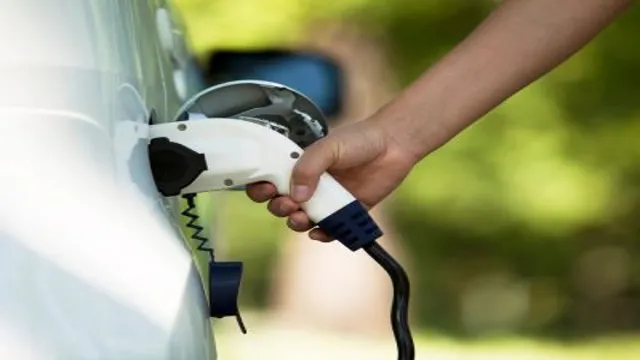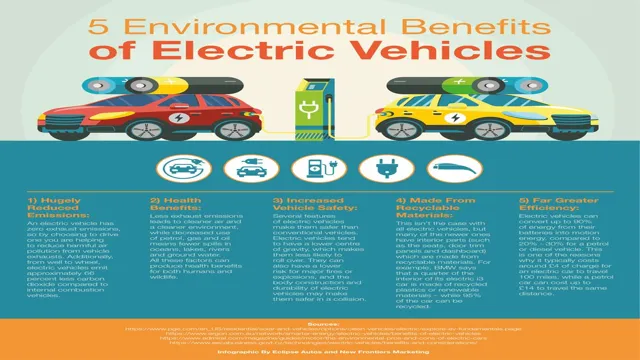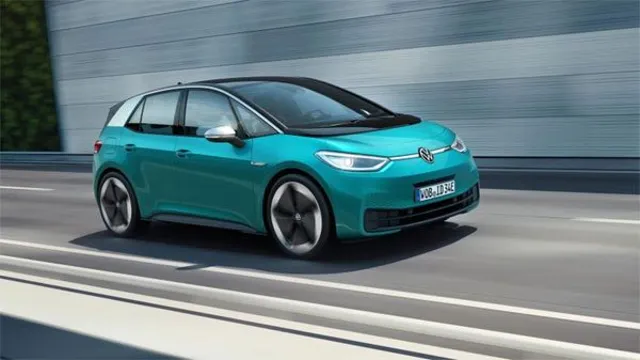Drive into a Sustainable Future: Uncovering the Top Benefits of Owning and Driving an Electric Car
Electric cars are quickly becoming the norm in the automotive industry, and it’s not just because they’re trendy or eco-friendly. Electric cars, also known as EVs, come with a plethora of benefits that could save you money, reduce your carbon footprint, and even make driving more enjoyable. From tax incentives to lower maintenance costs, owning an electric car has never been more rewarding.
So, what are the benefits of electric cars? In this blog, we’ll explore the many advantages that come with owning an EV and why you should consider making the switch.
Lower Overall Cost
One of the greatest benefits of buying an electric car is lower overall cost. Initially, electric cars can be more expensive than their gasoline counterparts. However, over time, owning an electric car will save you money.
By switching to electricity for fuel, you can save thousands of dollars on gasoline and oil changes. Additionally, electric cars typically have fewer moving parts than traditional cars, which means they require less maintenance. They also tend to have longer lifespans, saving you money on replacements in the long run.
With government incentives and tax credits available for electric car purchases, ownership costs can be even further reduced. So, while purchasing an electric car may require a larger investment upfront, it will ultimately lead to significant long-term savings.
Tax Credits and Incentives
Tax credits and incentives are a great way to lower the overall cost of a project. By offering financial rewards to individuals and businesses for engaging in certain activities, such as investing in renewable energy, governments can encourage the growth of industries that benefit society as a whole. For example, if you are planning to install solar panels on your property, you may be eligible for a tax credit that helps offset the cost of the installation.
Similarly, if you are a small business owner looking to upgrade your facility to be more energy-efficient, there may be grants or tax incentives available to help cover the costs. These incentives not only help lower the overall cost of the project, but they also promote sustainability and help reduce our carbon footprint. So, if you are considering making improvements to your property or investing in new technology, be sure to research any tax credits or incentives that may be available to you.

Lower Fuel and Maintenance Costs
Lowering overall cost is a primary concern for most vehicle owners, and one of the most effective ways to achieve this is through cutting down fuel and maintenance expenses. By purchasing a fuel-efficient car and keeping up with regular maintenance, you can reduce your overall cost of ownership. A vehicle that offers better fuel economy can save you a lot of money in the long run.
Efficient cars use less fuel and therefore require fewer trips to the gas station. This can translate to significant savings over the lifespan of your vehicle. Moreover, regular maintenance reduces the likelihood of costly repairs down the road, saving you both money and time.
By keeping up with scheduled services, you will catch small issues before they turn into major problems. In summary, investing in a fuel-efficient vehicle and practicing proper maintenance habits can bolster overall savings and reduce expenses.
Environmental Impact
If you’re looking to reduce your carbon footprint and help the environment, buying an electric car has numerous benefits. Firstly, because they don’t rely on fossil fuels, these vehicles emit far less pollution than traditional cars. This can help improve air quality, reduce greenhouse gas emissions, and combat climate change.
Additionally, electric cars are often more energy-efficient than their gasoline-powered counterparts, meaning they use less energy to travel the same distance. This makes them a more sustainable transportation option in the long run. Finally, as more people switch to electric cars, it can help drive demand for renewable energy sources and push car manufacturers to develop more environmentally friendly vehicles.
All of these factors combine to make electric cars a much better choice for the environment and a crucial part of our efforts to reduce our impact on the planet. So why not consider making the switch today?
Reduced Emissions
Reduced Emissions One of the biggest environmental concerns on the planet today is the amount of greenhouse gases we are pumping into the atmosphere. Emissions from cars, factories, and power plants are largely responsible for this, and the impact on the environment has been severe. However, there are steps we can take to reduce emissions and limit their impact.
For individuals, this might mean driving less, using public transportation, and buying energy-efficient appliances. For businesses, it might mean investing in renewable energy sources and reducing waste. Governments can also play a role by implementing policies that encourage clean energy and penalize polluters.
By working together and taking action to reduce emissions, we can help to protect the environment and ensure a healthier planet for future generations.
Sustainability and Renewable Energy
When it comes to sustainability and renewable energy, one of the primary concerns is the environmental impact. While the aim of these initiatives is to reduce our reliance on non-renewable resources and mitigate the effects of climate change, it’s important to ensure that we aren’t simply replacing one set of problems with another. The production and disposal of renewable energy sources, such as wind turbines and solar panels, can have significant environmental impacts.
For example, the manufacturing process for solar panels requires the use of toxic chemicals, and their disposal can lead to hazardous waste. Similarly, wind turbines can be a threat to wildlife, including birds and bats. So, how can we balance the benefits of renewable energy with the potential environmental costs? One approach is to focus on improving the sustainability of these technologies.
This might involve investing in research to develop more eco-friendly manufacturing processes, or finding ways to recycle or repurpose renewable energy equipment at the end of its lifespan. Additionally, careful planning and site selection can help to minimize the impact of wind turbines or solar farms on local ecosystems. Ultimately, our goal should be to create a sustainable energy system that not only reduces our carbon footprint but also prioritizes the health and well-being of our planet and its inhabitants.
Performance and Convenience
One of the main benefits of buying an electric car is the combination of both performance and convenience. Electric cars offer instant torque and acceleration, providing a thrilling driving experience. Additionally, they are incredibly easy to charge with access to charging stations across the country and the convenience of charging from home.
This means no more stops for gas, no more oil changes, and less maintenance overall. Not only does this save time, but the cost savings on fuel and maintenance can add up in the long term. The advancements in technology have also improved the range of electric cars, making them a viable option for longer trips.
Investing in an electric car not only benefits the environment but also offers a practical and enjoyable driving experience. So why not make the switch to electric and reap the rewards of performance and convenience?
Instant Torque and Smooth Operation
Instant torque and smooth operation are two of the key features that electric vehicles bring to the table. With an electric motor, you’ll find that acceleration is not only powerful but also extremely smooth. Unlike gas engines, you don’t have to rev up the engine before a surge of power is delivered.
Instead, electric motors provide plenty of torque under all circumstances, which means you get instant power the moment you hit the accelerator. This not only makes for an exciting driving experience, but it also improves efficiency since you can get up to speed quickly without wasting energy or gas. Moreover, the electric motor operates almost silently, so you can enjoy a peaceful ride while still tearing down the road.
It’s like having the best of both worlds – high performance and convenience. So, if you’re looking for a vehicle that’s not only eco-friendly but also fun to drive, an electric car might just be what you need.
Convenient Charging and Range
When it comes to electric vehicles, performance and convenience are two key factors that drivers consider. One of the most significant conveniences of an electric vehicle is the ease of charging. EVs can be charged at home overnight or at a growing number of public charging stations across the country.
The development of rapid charging technology also means that drivers can quickly top up their battery during longer journeys. This convenience is further enhanced by the impressive range of most modern electric vehicles, which can go over 300 miles on a single charge. So, not only are EVs convenient to charge, they also offer a range that is more than satisfactory for most drivers’ daily needs.
With advancements in battery technology and the rollout of more charging infrastructure, EVs are becoming an increasingly realistic and practical option for drivers.
Future-Proof Investment
Purchasing an electric car is a future-proof investment that provides numerous benefits. Not only does owning an electric car reduce your carbon footprint, but it also saves you money on gas and maintenance costs over time. Charging an electric car is significantly cheaper than filling up a tank with gasoline, and the absence of an engine means fewer repairs and maintenance.
Moreover, electric cars come with advanced features, such as regenerative braking, which recharge the battery while you drive. That means your car can gain power while slowing down, further reducing the need for charging. Additionally, as electric cars continue to rise in popularity, their resale value remains high, making them a sound financial decision.
So, investing in an electric car is not only beneficial for the environment and your wallet, but it’s also a smart decision for your future.
Rising Gas Prices
Gas prices have been on the rise in recent years, causing concern for many people who rely on their cars for transportation. However, one way to future-proof your investment amidst this uncertainty is by purchasing an electric vehicle (EV). EVs are becoming increasingly popular as they offer a cost-effective and environmentally friendly alternative to traditional gas-powered cars.
With affordable options now available on the market, such as the Tesla Model 3, a reliable and stylish electric car is within reach for many consumers. And not only can owning an EV save money on fuel costs, but it also eliminates the need for oil changes and reduces maintenance costs in the long run. As gas prices continue to fluctuate, investing in an electric vehicle is a smart way to protect yourself from escalating fuel costs while also doing your part to help the environment.
So why not consider making the switch to an EV and future-proof your investment today?
Advancements in Electric Vehicle Technology
Investing in electric vehicles and their technology is a future-proof investment, as advancements are continuously being made in this field. From battery technology to charging infrastructure, the progress being made is impressive. The new solid-state batteries provide higher energy density and faster charging, increasing the range and convenience of electric vehicles.
Furthermore, charging infrastructure is being expanded, with new technologies allowing for even faster and more efficient charging times. With the push towards clean energy and the phasing out of fossil fuels, the demand for electric vehicles will only continue to grow. Investing in electric vehicle technology now could provide significant returns in the future, as the industry continues to evolve and improve.
So why not invest in a technology that is not only environmentally friendly but also offers a promising financial future?
Conclusion
In conclusion, buying an electric car is like jumping into a time machine that propels you into a future of savings, sustainability, and a smooth and silent ride. With lower fuel costs, reduced emissions, and advanced technology, electric cars provide a smart and savvy way to navigate today’s congested roads. It’s a win-win situation, benefiting both your pocket and the planet, so why not join the electric revolution and charge towards a brighter and cleaner future?”
FAQs
How does owning an electric car benefit the environment?
Electric cars produce zero emissions and reduce dependence on fossil fuels, which helps to mitigate air pollution and combat climate change.
Are electric cars more expensive to maintain than gas-powered cars?
Generally, no. Electric cars have fewer moving parts and require less frequent maintenance, leading to lower long-term costs.
How long does it take to charge an electric car?
Charging times vary depending on the battery size and charger type, but can range from 30 minutes to several hours. Fast charging stations can charge up to 80% of the battery in as little as 30 minutes.
Can electric cars travel long distances without needing a recharge?
Yes, most modern electric cars have a range of 200-300 miles per charge. However, long road trips may require planning around charging stations along the route.
How does the cost of electricity compare to gasoline as a fuel source for cars?
On average, electricity is cheaper than gasoline per gallon equivalent. This translates to lower fuel costs for electric cars compared to gas-powered cars.






